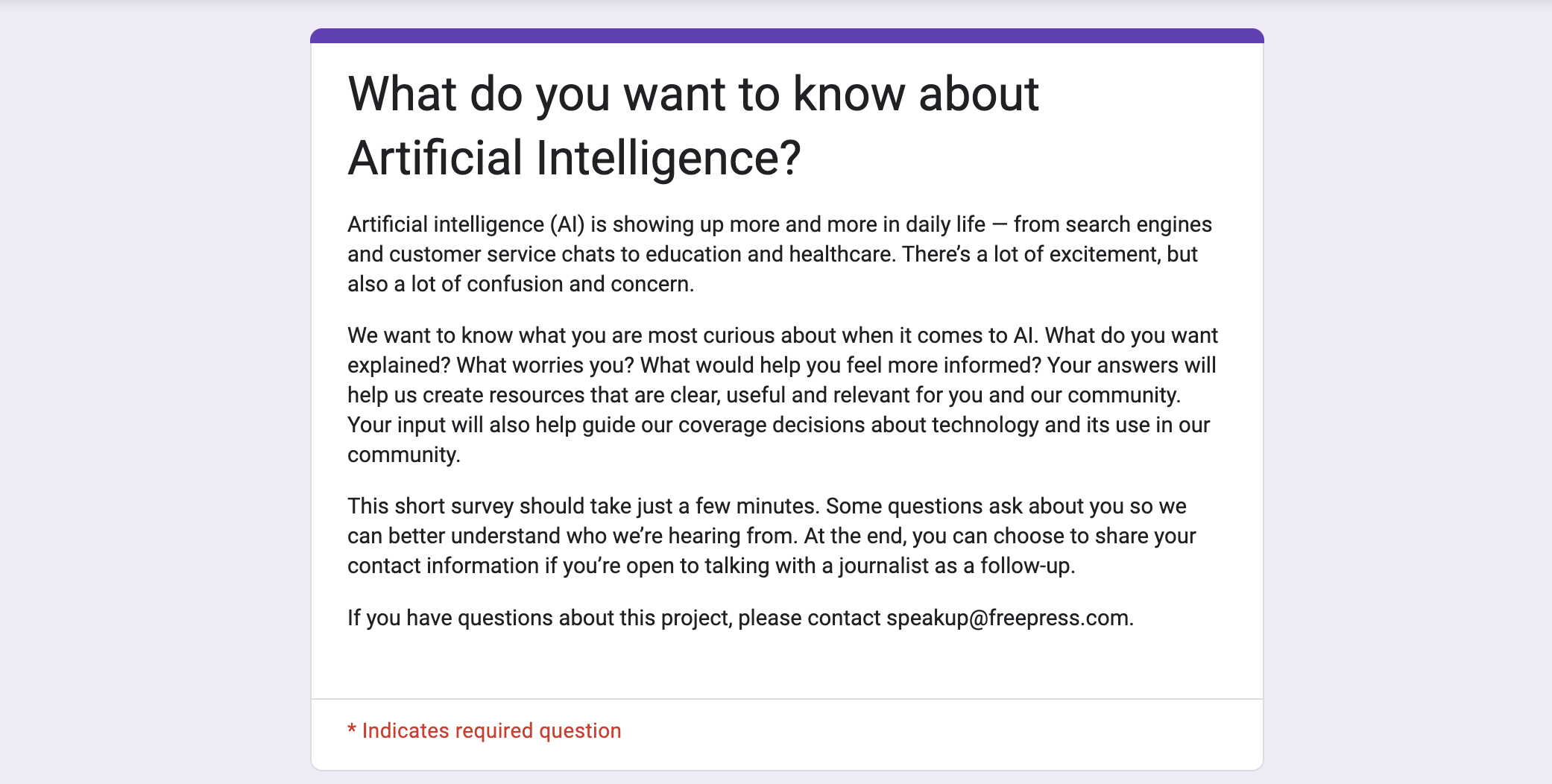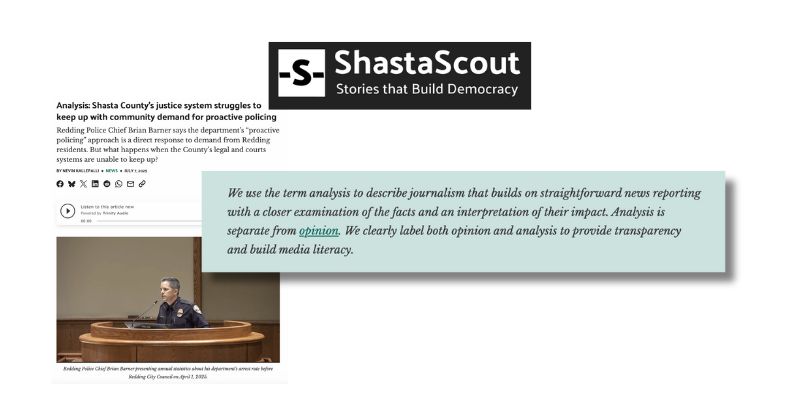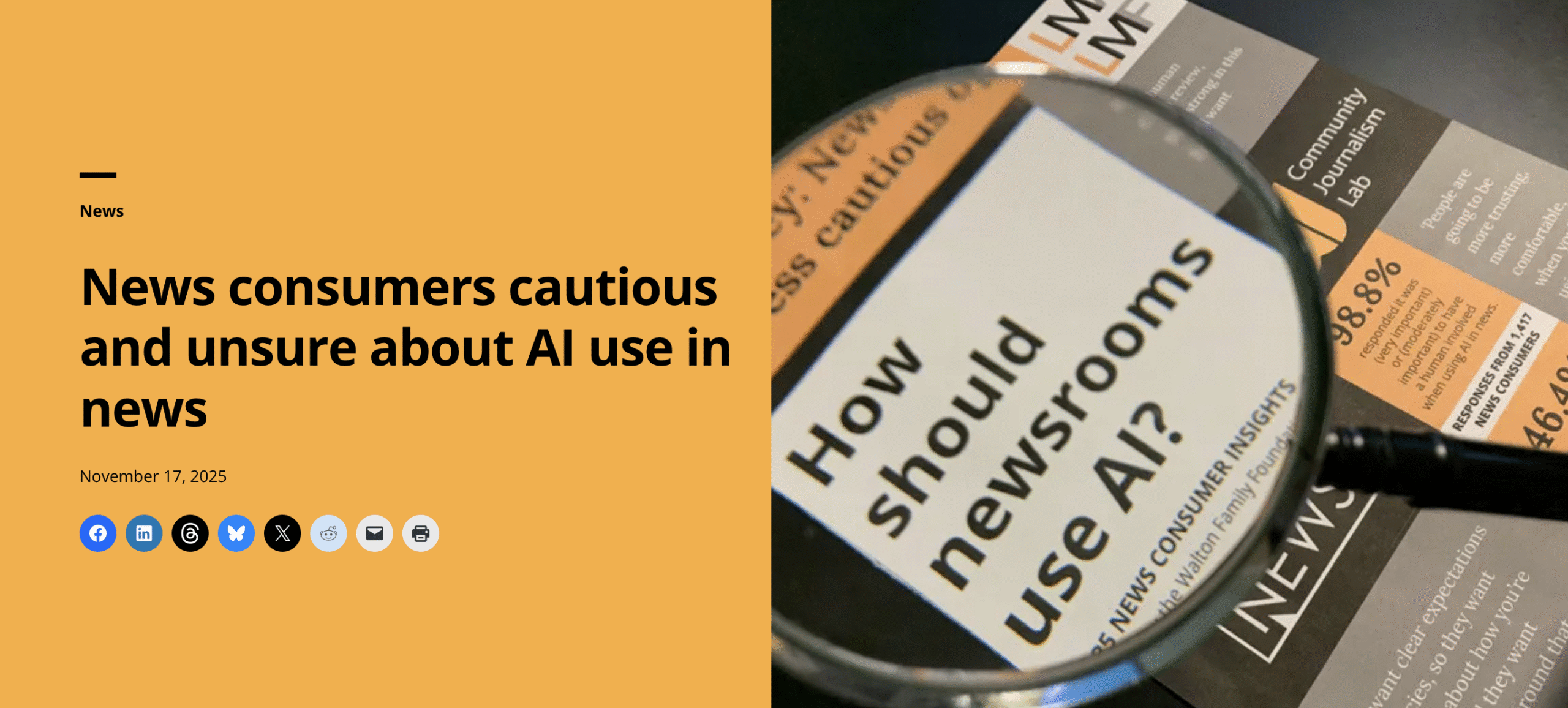
This weekly Trust Tips newsletter shares quick, actionable tips for how journalists can earn and sustain trust. Subscribe to get it in your inbox at trustingnews.org/newsletter.
Ask your audience these questions about your use of AI
Want to get this Trust Tips newsletter in your inbox each Tuesday? Subscribe here.
For a year and a half, Trusting News has been working with newsrooms to learn how audiences respond, and what they expect, when journalists use AI. To help newsrooms understand what that means in their own communities, we have been encouraging them to ask their audiences directly.
New research from newsrooms participating in the Local Media Association’s AI Community Journalism Lab deepens that understanding and reinforces what we’ve seen in earlier Trusting News research. From this new research and previous research we know:
- People want humans involved and want human review of AI-assisted/created content.
- Transparency is key — and people want more information, not less.
- To help build trust, journalists should update their ethics policy to include AI.
- Comfort level with AI use in news varies, and many people are still unsure what they think about it.
While the general findings and takeaways support what we have heard before, every community is different. Decisions about AI shouldn’t just be based on efficiency or innovation — they should reflect what communities are comfortable with and should meet their expectations for transparency.
What newsrooms can do
If your newsroom is using AI, it’s important to understand your audience’s concerns and expectations around that use. As we’ve shared before, we’ve published the survey and community listening guide we’ve used in our own research, to help you learn how your community feels about AI use in journalism and what they expect when you use it.
We recognize that resources are limited, and your team might not have the bandwidth for a survey and one-on-one interviews. If that’s the case, consider how else you might engage with your community around this topic.
For example, try asking just one of these questions:
How specific should explanations about our news organization’s use of AI be?
- I want to know if it was used but don’t need any other details
- I want to know if it was used and want details about how it was used
- I want to know if it was used and want details about how it was used and what tools were used
- I don’t want to know if AI was used in your news content
Which of the following would help build your trust when AI is used in journalism?
- A clear explanation of what AI did (and what it didn’t do)
- Knowing AI is only used for behind-the-scenes tasks (not for writing the story)
- The ability to ask questions or give feedback about the use of AI
- A policy that limits or guides how AI can be used
- Something else? (Please specify)
Asking either or both of those questions can help provide guidance on how transparent you should be with your audience about your AI use. It can also help you decide how much information to include in AI use disclosures and learn if there is anything else your community needs in order to trust your coverage as you incorporate AI into your practices.
You could share these questions on social media (consider the poll feature) or as a callout in a newsletter, on air or in print.
Another idea is to ask a question that focuses on your audience’s comfort level with specific use cases. As you decide whether and how to use AI, how about giving them a seat at the decision-making table? You can personalize this by replacing, removing or adding any AI use cases that best apply to what your newsroom is already using or is considering.
If our news organization experimented with AI-generated efficiencies or AI-generated content, how acceptable would each of the following uses be to you?
AI use cases to ask about:
- Transcribing interviews
- Translating content into other languages
- Converting text to audio
- Researching stories
- Preparing questions for interviews
- Analyzing data
- Helping reporters write first drafts of stories
- Writing and compiling stories without human review
- Editing stories to improve clarity, spelling, and grammar
- Summarizing stories into briefs
- Writing headlines
- Writing social media posts
- Creating and producing images
- Creating chatbots to help answer readers’ questions
- Producing and posting breaking news alerts
Provide a scale with the following options to measure comfort level: Mostly acceptable, Somewhat acceptable, Neutral/Unsure, Somewhat unacceptable, Mostly Unacceptable.
If you ask one or more of these questions or use our survey, we’d love to hear what you learn! Get in touch at Lynn@TrustingNews.org.
Trusting News AI resources
We hope you will use our resources and tools to make your use of AI ethical and trustworthy. All of them can be found in the AI Trust Kit and below.
Resources to help you be ethical:
- A resource to help spot and disclose AI in content you don’t control.
- A collection of research to help you understand how the public feels about AI.
Resources to help you listen:
- A survey to learn how your community feels about AI and your use of it.
- A community interview guide to dive deeper into those feelings.
- Questions to ask to get regular community feedback on your use of AI.
Resources to help you be transparent:
- A worksheet to create an AI use policy.
- A worksheet to create in-story AI use disclosures.
- Sample language to copy/paste into AI use disclosures and policies.
- Newsroom examples of AI policies, AI use disclosures and other AI transparency initiatives.
At Trusting News, we learn how people decide what news to trust and turn that knowledge into actionable strategies for journalists. We train and empower journalists to take responsibility for demonstrating credibility and actively earning trust through transparency and engagement. Learn more about our work, vision and team. Subscribe to our Trust Tips newsletter. Follow us on Twitter, BlueSky and LinkedIn.

Assistant director Lynn Walsh (she/her) is an Emmy award-winning journalist who has worked in investigative journalism at the national level and locally in California, Ohio, Texas and Florida. She is the former Ethics Chair for the Society of Professional Journalists and a past national president for the organization. Based in San Diego, Lynn is also an adjunct professor and freelance journalist. She can be reached at lynn@TrustingNews.org and on Twitter @lwalsh.



